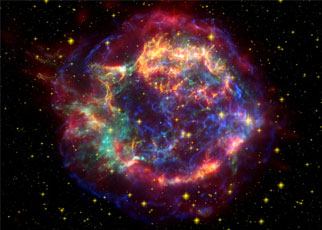|
TRANSLATE THIS ARTICLE
Integral World: Exploring Theories of Everything
An independent forum for a critical discussion of the integral philosophy of Ken Wilber
 Elliot Benjamin is a philosopher, mathematician, musician,
counselor, writer, with Ph.Ds in mathematics and psychology and the author of over 230 published articles in the fields of humanistic and transpersonal psychology, pure mathematics, mathematics education, spirituality & the awareness of cult dangers, art & mental disturbance, and progressive politics. He has also written a
number of self-published books, such as: The Creative Artist, Mental Disturbance, and Mental Health. See also: www.benjamin-philosopher.com.
SEE MORE ESSAYS WRITTEN BY ELLIOT BENJAMIN
Life, Death,
Meaning, and Purpose
Elliot Benjamin
Sometimes I wonder if I lack a gene, or perhaps have an extra gene, that makes me "different" from other people.
Sometimes I wonder if I lack a gene, or perhaps have an extra gene, that makes me “different” from other people. I never learned how to make chit-chat small talk, I never got the hang of picking up girls at bars, and parties where you just go around and get into conversations with everybody were always very uncomfortable for me. In a similar way, I wonder if I am just missing something here—or perhaps having too much of something here—when I read essays like David Lane's recent Integral World essay Understanding the Improbable [1] (written with Andrea Diem-Lane) where they strongly defend having a materialistic view of the world as being at least as, if not more, “meaningful” than having a spiritual view of the world.
Now I have the utmost respect for David as an extremely sharp thinker and writer, and David's perspective is in very good company—which includes our esteemed Integral World founder Frank Visser—whom I also have the utmost respect for, as well as gratitude for publishing all my essays on Integral World, and world-famous atheist scientists Richard Dawkins, Steven Hawking, and Lawrence Krauss [2]. Thus it is not David per se who is the target of this essay, but rather I am questioning why it is that I feel this intensive unrelenting need for “meaning” in the universe, aside from the kind of personal meaning that Richard Dawkins eloquently writes and talks about [3].
Sometimes I wish that I were able to have the kind of personality that did not need this kind of meaning in the universe, or the kind of “purpose” that Steve McIntosh writes about [4] and Barbara Marx Hubbard gives Shift courses about [5]. But then again I wonder: am I really all that alone in my perpetual need to find meaning in life and in death that is universal and beyond my personal meaning? After all, isn't this need to find universal meaning in life and in death the essential reason that religion became such a universal phenomenon in the lives of human beings to begin with? Perhaps it is the atheist materialistic perspective that is “unusual” for the human being.
I can remember when I read Frank Visser's Big History 2012 Integral World essay [6], it struck me how ultra-insignificant I am if all there was to the universe were these explosions of stars and formation of Hydrogen and Helium, without any purpose or meaning or plan. Now I understand that not everyone takes this sense of ultra-insignificance personally or lets it get to them, as people like Richard Dawkins and David Lane convey very well. But if all I am is a formation of chemicals that came about for no “meaningful” or “purposeful” reason whatsoever, and when I die that is it—well to be very candid I find this sad.
I suppose this is why I have always been so taken with the question of what happens to us when we die, and why last weekend I found myself at a Mediumship Mastery workshop [7]. But the answers I get from people with spiritual perspectives are not at all satisfying to me, as I described in my essay An Agnostic Skeptic with Mediumistic Abilities (cf. [7]). I was recently told in no uncertain terms by the editor of a publication put out by an organization that promotes belief in an afterlife, in which I have published a few articles, that I need to stop my “fence-sitting” and take a stand on believing in an afterlife. But I am not able to take this kind of stand, as I just see both sides of the issue. And this is why I am comfortable—or as comfortable as I am able to be—as an agnostic.
When I think about it, David Lane's perspective makes perfect sense. You make the most of the life you now have, and you come to terms with the fact you are here for no meaningful universal reason or purpose, and that when you die there will no longer be any “you” other than in what you leave behind in your creative life activities and in the memories of others. And yet this perspective leaves me feeling somewhat depressed when I think too much about it. But maybe that's just because I am lacking a gene.
Oh well—writing always makes me feel better, so I thought I would try it out for the gene that I seem to be lacking. Now what should we call this gene? Perhaps we should call it the “not caring that there is no purpose or meaning to the universe” gene? It seems that if you are lucky enough to possess this gene then you are able to go through life with a materialist perspective and not get depressed about it. But if you are lacking this gene, like I am, then you are destined to spend your life searching for meaning to the universe, aside from meaning in your own life.
Thus at my weekend Mediumship Mastery workshop, I continuously heard the term “spirit world” tossed around by the medium who led my workshop, as well as some of the students in the class. And I must admit that I would find it comforting if I were able to believe in this kind of “spirit world”—a world where spirits are alive and thrive, where when your body dies your “soul” lives on—where who you are is much more than your body could ever imagine—where you are an eternal spirit who never dies. Well this is what Spiritualists believe [8], but this is not what I am able to believe, as I described in my recent essay (cf. [7]).

But when I do my creative mathematics, when I play the piano practicing for a chamber music week this summer I am intending to take part in, and when I write essays like this, I start to feel better. Then it doesn't seem to matter so much to me if we are nothing more than chemicals that came about for no particular universal reason or purpose, and will get completely stamped out when we die with no “spiritual” traces remaining. For somehow doing these creative things makes me feel like I am being who I am, and I suppose this is why I am now going into my second year of facilitating my free monthly creative artist support group meetings in my Belfast, Maine community. Yes I can feel myself starting to get reactivated as I express my thoughts, knowing that in all likelihood Frank Visser will publish them on Integral World.
Is there any universal meaning or purpose that involves my writing an essay expressing my thoughts? Well it's Friday night and I think I'll indulge in my frequent Friday night habit of spacing out with some wine cooler and cheese doodles while I listen to some very old-fashioned show music from the 1950s on my “record player.” But while I am doing this, my subconscious will be hard at work pondering if there could possibly be any meaning or purpose to the universe, and if I come up with any creative insights I'll be sure to let you know.
Notes/References
1) See David Lane & Andrea Diem-Lane (2014), Understanding the Improbable:
Exploring Jeffrey Kripal's Supernatural Challenge. Retrieved from
www.integralworld.net
2) See for example Richard Dawkins (1986), The Blind Watchmaker: Why the Evidence
of Evolution Reveals a Universe Without Design. New York: W. W. Norton & Co.;
Stephen Hawking (1988), A Brief History of Time: From the Big Bang to Black Holes.
New York: Bantam Books; Lawrence Krauss (2012), A Universe from Nothing: Why
There is Something Rather than Nothing. New York: Free Press.
3) Richard Dawkins makes a point of conveying in a number of his books how he very
much finds personal meaning in the universe, but not universal meaning or purpose.
See a video of him in dialogue with Deepak Chopra where Dawkins passionately describes the deep experience of awe that he has experienced in nature. [See also "Sex, Death and the Meaning of Life", a Channel4 2012 documentary by Richard Dawkins, FV]
4) See Steve McIntosh (2012), Evolution's Purpose, An Integral Interpretation of the Scientific Story of Our Origins. New York: SelectBooks.
5) See Barbara Marx Hubbard (2001), Emergence: The Shift from Ego to Essence: 10
Steps to the Universal Human, Charlottesville, VA: Hampton Roads Pub; and Elliot
Benjamin (2013), Andrew Cohen's Notable Supporter: Conscious Evolutionary
Barbara Marx Hubbard. Retrieved from www.integralworld.net
6) See Frank Visser (2012), Integral Theory and the Big History Approach: A
Comparative Introduction. Retrieved from www.integralworld.net
7) See Elliot Benjamin (2014), An Agnostic Skeptic with Mediumistic Abilities: My
Reflections at a Mediumship Mastery Workshop. Retrieved from
www.integralworld.net
8) By the term “Spiritualists” I am referring to the religion of Spiritualism; see for
example http://en.wikipedia.org/wiki/SpiritualistChurch
|
 Elliot Benjamin is a philosopher, mathematician, musician,
counselor, writer, with Ph.Ds in mathematics and psychology and the author of over 230 published articles in the fields of humanistic and transpersonal psychology, pure mathematics, mathematics education, spirituality & the awareness of cult dangers, art & mental disturbance, and progressive politics. He has also written a
number of self-published books, such as: The Creative Artist, Mental Disturbance, and Mental Health. See also: www.benjamin-philosopher.com.
Elliot Benjamin is a philosopher, mathematician, musician,
counselor, writer, with Ph.Ds in mathematics and psychology and the author of over 230 published articles in the fields of humanistic and transpersonal psychology, pure mathematics, mathematics education, spirituality & the awareness of cult dangers, art & mental disturbance, and progressive politics. He has also written a
number of self-published books, such as: The Creative Artist, Mental Disturbance, and Mental Health. See also: www.benjamin-philosopher.com.

